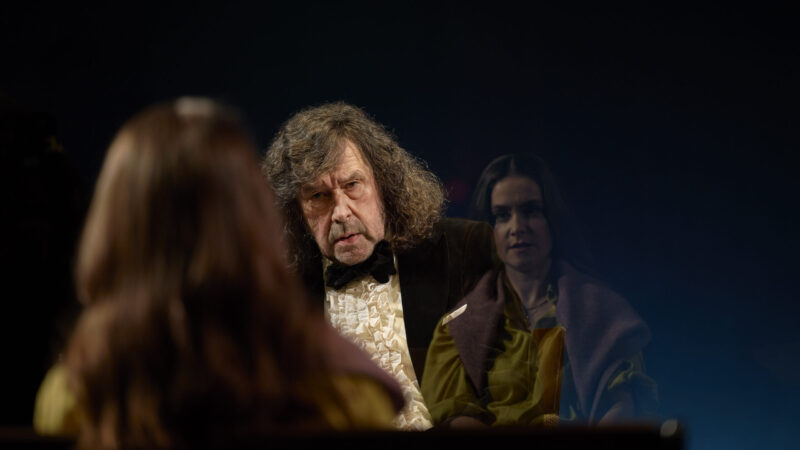
The Visiting Hour, a new production from the Gate Theatre written by Frank McGuinness and directed by Caitríona McLaughlin, was a show with huge promise and a stellar cast that ultimately failed to deliver on the themes it established. The show followed a daughter on a window visit to her father’s care home, as they discussed his life’s story through distorted memories.
Played by Stephen Rea, the father spent most of the show reminiscing about his past. Rea’s acting had excellent moments, evoking empathy from the audience while allowing the character to be cold, and even cruel at times. While the writing never truly clarified this, the mannerisms Rea adopted were reminiscent of Alzheimer’s disease or dementia, which would explain why he was unable to remember his past properly.
The lack of clarity in the writing, marketing and acting as to what the father was struggling with made this a difficult topic to address. As someone who has watched a loved one pass away from Alzheimer’s, I noticed that the father seemed much more coherent in his speech and his memories than someone with Alzheimer’s would usually be as they generally retreat to a specific moment in the past.
Sometimes, the energy of a room is more important to a patient with Alzheimer’s than the words being said as they can still sense what people are feeling. In this respect, the bond between father and daughter felt too stiff. Perhaps this was a nod to a toxic relationship history, but if this was the case, it was lost among the rest of the themes that the show attempted to address.
The importance of music and performance to the father was illustrated through witty scenes about an imaginary performance in the Eurovision and songs sung with the daughter. This was an excellent set-up for connecting the daughter’s identity to her father’s through important moments in their past. Had the songs been used to engage with his past realities and explore the impacts of these losses of communication, or if the songs had offered his daughter a way into such discussions, the theme would have been given much more weight.
Judith Roddy, who played the daughter, lacked the emotional connection to Rea’s character required to pull off the themes the show attempted to explore. It was clear that she had great potential – one moment where this shone through was when she confronted her father, who had distorted her memories of their song and confused her for her mother, an old sweetheart, her imagined sisters and even an imagined brother. Roddy’s character appeared conflicted, at times despising her father, at times protecting him from the truth. Having more lines and more emotion from her devoted to her side of the story would have helped to clarify the nature of their relationship.
One of the most poignant moments in the play was when Roddy’s character created a fabrication to explain her mother’s death because her father couldn’t handle the truth. This hinted at a darker past in relation to the mother which left the father with trauma he was unable to process. Giving moments such as these and Roddy’s character as a whole more time in the spotlight would have given the play the emotional impact it needed, allowing these characters to explore taboos and painful moments in their relationship.
Overall, while the production was high-quality with some beautiful moments, its impact was confusing. Had the writing been clearer or centred on a single issue, and made better use of Roddy’s character, the show would have been heart-breaking. As it stands, The Visiting Hour was enjoyable but confusing at best, and superficial at worst.
The Visiting Hour was broadcast live from venues across the country from April 22nd to 24th. This virtual tour aspect of the production had not only increased outreach and involved local venues but helped people feel as though they were “attending” their local theatre, perhaps for the first time since the pandemic began. This no doubt lifted people’s spirits and gave an important sense of community back to the audience.






